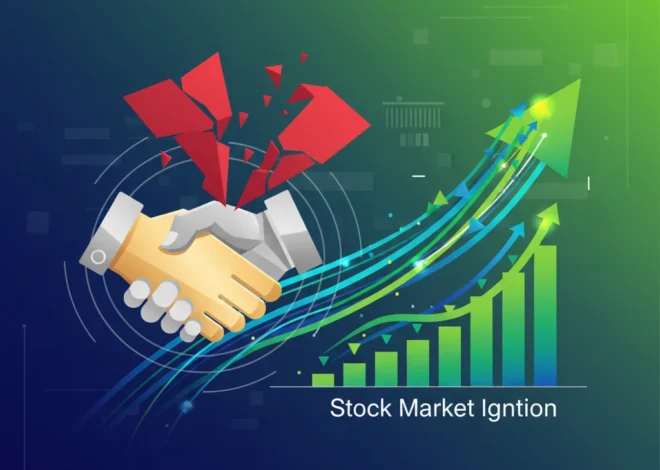
The Chip War Comes to Europe: Why the Netherlands Just Nationalized a Tech Deal
In the intricate world of global finance and technology, a seemingly minor corporate acquisition has just sent major shockwaves across the geopolitical landscape. The Dutch government, in a move signaling a dramatic policy shift, has intervened to block the Chinese-owned company Nexperia from completing its takeover of Nowi, a Dutch semiconductor startup. Citing national security concerns, this decision is far more than a simple regulatory hurdle; it’s a clear declaration that the global “chip war” has firmly arrived on European shores.
This event is a critical data point for investors, business leaders, and anyone involved in the global economy. It underscores a powerful trend: the increasing fusion of national security, technology, and economic policy. What was once the domain of free-market transactions is now a frontline in the strategic competition between global powers. Understanding the “why” behind this move is essential to navigating the future of international investing, supply chains, and the broader stock market.
The Deal That Sparked a National Response
At the heart of this issue are three key players: Nexperia, Nowi, and the Dutch government. To grasp the significance of the state’s intervention, we must first understand who they are and what’s at stake.
- Nexperia: While headquartered in Nijmegen, Netherlands, Nexperia is a subsidiary of the Chinese technology company Wingtech Technology. It’s a major player in the semiconductor industry, producing basic chips and transistors used in a vast array of products, from cars to consumer electronics.
- Nowi: A small but innovative Dutch startup based in Delft, Nowi specializes in a niche but critical technology: energy-harvesting Power Management Integrated Circuits (PMICs). These chips are designed to draw power from ambient sources like light, heat, or radio waves, enabling small devices and sensors (the “Internet of Things”) to operate without traditional batteries.
- The Dutch Government: Historically a champion of free trade and open investment, the government’s stance has hardened. It utilized a new law, the Investment, Mergers and Acquisitions Security Screening Act (known as the “Vifo Act”), to retroactively review and ultimately block the deal, which was completed in 2022. The government stated the move was necessary to prevent “undesirable transfer of sensitive and high-quality technology” (source).
While Nowi’s technology might seem obscure, its potential applications in both civilian and military sensors, autonomous systems, and critical infrastructure make it highly sensitive. The government’s fear is that such foundational technology falling under the control of a Chinese-owned entity could compromise national security and diminish the Netherlands’ technological sovereignty.
A Micro-Decision in a Macro-Conflict: The Global Chip War
The Nexperia-Nowi affair cannot be viewed in isolation. It is a direct consequence of the escalating technological rivalry between the United States and China, often dubbed the “Chip War.” Semiconductors are the bedrock of the modern economy, powering everything from artificial intelligence and 5G networks to advanced weaponry. Dominance in this sector is seen as a prerequisite for global economic and military leadership in the 21st century.
The Netherlands holds a uniquely powerful position in this conflict. It is home to ASML, the world’s only manufacturer of the extreme ultraviolet (EUV) lithography machines required to produce the most advanced microchips. Under significant pressure from Washington, the Dutch government has already implemented export controls restricting ASML from selling its top-tier equipment to China (source). The move to block the Nowi acquisition is a logical, albeit more direct, extension of this policy of “techno-nationalism.”
This strategic alignment with the U.S. demonstrates a fundamental shift in European economics. The era of prioritizing purely commercial interests is giving way to a new paradigm where geopolitical considerations are paramount, directly impacting finance and investment flows.
The Rise of Economic Statecraft and Investment Screening
Governments worldwide are expanding their toolkits for economic statecraft. The primary weapon in this new era is the foreign direct investment (FDI) screening mechanism. These bodies review inbound investments for potential national security risks, giving states the power to block deals that were previously a matter for corporate boardrooms.
The Dutch Vifo Act is a powerful example, but it’s part of a global trend. Here’s a brief comparison of how different economic blocs are approaching this:
| Entity / Region | Screening Body | Key Focus Areas | Notable Power |
|---|---|---|---|
| United States | CFIUS (Committee on Foreign Investment in the U.S.) | Critical technology, critical infrastructure, sensitive personal data. | Broad authority to block deals and force divestment, with a strong focus on China. |
| European Union | EU FDI Screening Framework | Coordinates member states’ efforts; focuses on dual-use tech, AI, robotics, semiconductors. | Provides guidance and information sharing, but final decisions rest with member states. (source) |
| Netherlands | BTI (Bureau Toetsing Investeringen) under Vifo Act | Vital suppliers, sensitive technology (including dual-use). | Power to review deals retroactively, as seen in the Nowi case. |
| China | NDRC / MOFCOM | Reviews foreign investment into China but also scrutinizes outbound investment to ensure alignment with state goals. | Operates with less transparency, often blending industrial policy with security reviews. |
This regulatory patchwork creates a complex and uncertain environment for international finance. A deal that is commercially sound can be scuttled by political winds, adding a significant layer of risk that must be factored into any cross-border trading or investment strategy.
Implications for the Future of Investing and Business
The Dutch government’s decision is not an isolated event but a signpost pointing toward the future of the global economy. The ripple effects will be felt across sectors.
For Investors and the Stock Market:
The primary takeaway is the institutionalization of geopolitical risk. When analyzing a company, especially in the tech sector, due diligence must now extend beyond balance sheets and market share. Key questions include:
- Supply Chain Sovereignty: Where are its critical components sourced? How exposed is it to geopolitical chokepoints like Taiwan or the South China Sea?
- Investor Base: Who are the major shareholders? Could the presence of state-owned enterprises or investors from rival nations trigger a security review?
- Technological Sensitivity: Does the company produce “dual-use” technology that could have military applications? This is becoming an increasingly broad category.
Companies with insulated, secure, and politically “friendly” supply chains may soon command a premium on the stock market. Conversely, those with heavy exposure to geopolitical fault lines will likely see their risk profile, and potentially their valuation, adjusted downwards. The volatility in trading semiconductor stocks following major policy announcements is a clear indicator of this new reality.
For Business Leaders and Corporate Strategy:
The era of frictionless globalization is over. The “just-in-time” supply chain model is being replaced by a “just-in-case” model that prioritizes resilience over pure efficiency. Strategies like “de-risking” and “friend-shoring”—moving supply chains to allied nations—are no longer theoretical concepts from economics textbooks; they are urgent boardroom imperatives.
Furthermore, startups in sensitive sectors must now be highly strategic about their funding sources. Accepting capital from certain venture funds or corporate investors could preclude future expansion into key markets like the United States or Europe. This has profound implications for the venture capital and banking sectors that facilitate this flow of capital.
Conclusion: A New World for Global Finance
The forced reversal of Nexperia’s acquisition of Nowi is a microcosm of a monumental shift in the global order. It demonstrates that the Netherlands, and Europe by extension, is no longer willing to be a passive playing field for great power competition. National and regional security interests are now explicitly tied to economic and industrial policy.
For those in finance, investing, and business, this new landscape demands a more sophisticated, multi-disciplinary approach. A deep understanding of economics must now be paired with a keen awareness of geopolitics. The value of a company, the stability of a supply chain, and the future of an entire industry can now be altered not just by market forces, but by a single government decree. The chip war is just one theater in this new reality, and its impact on the global economy is only beginning to unfold.


